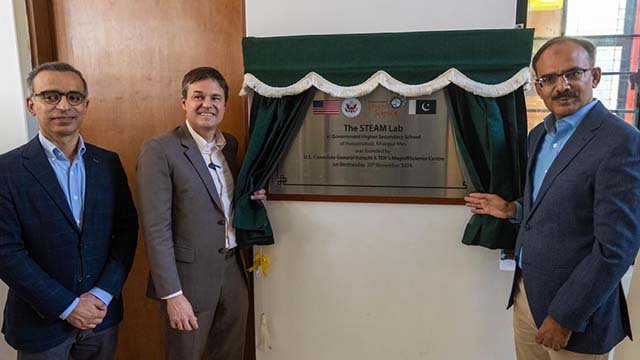The U.S. Consul General Scott Urbom concluded a three-day visit to Northern Sindh, where he reinforced the United States’ commitment to Pakistan’s economic development and community empowerment.
During his trip, Urbom inaugurated a STEAM (Science, Technology, Engineering, Arts, and Mathematics) lab at the Government Higher Secondary School of Hussainabad.
Developed with The Dawood Foundation and funded through a U.S. Consulate grant, the lab promotes creative, hands-on learning for underserved communities.
“This lab embodies the U.S. Government’s commitment to fostering creativity and equipping Pakistan’s youth with skills to shape their future,” said Urbom.
The school is part of USAID’s Sindh Basic Education Program, which constructed 106 schools to improve educational access in the province.
Urbom also engaged with alumni of the Academy for Women Entrepreneurs (AWE) program at the Sachal Sarmast Library, celebrating their entrepreneurial successes in food and handicrafts.
“Empowered women entrepreneurs are key drivers of progress, and we are proud to support programs that unlock potential and inspire leadership,” Urbom remarked.
At Sukkur IBA University, Urbom met with students of the English Works program and Vice Chancellor Dr. Asif Ahmed Shaikh to discuss a U.S.-funded partnership with Vanderbilt University, aimed at enhancing STEM education.
In Jacobabad, Urbom visited the USAID-funded Jacobabad Institute of Medical Sciences (JIMS), a 133-bed hospital serving over one million people.
He highlighted the facility’s role in providing quality maternal and child healthcare, stating, “Together, we’re ensuring brighter futures for women, children, and marginalized communities in Pakistan.”
Urbom also toured a USAID-funded water filtration plant serving over 14,000 households.
“Access to clean water is fundamental to health and prosperity. This plant reflects the U.S. commitment to sustainable development,” he said.
Throughout his visit, Urbom engaged with local officials and communities, reinforcing the long-standing U.S.-Pakistan collaboration in education, healthcare, and infrastructure to foster a brighter future for Pakistan.










